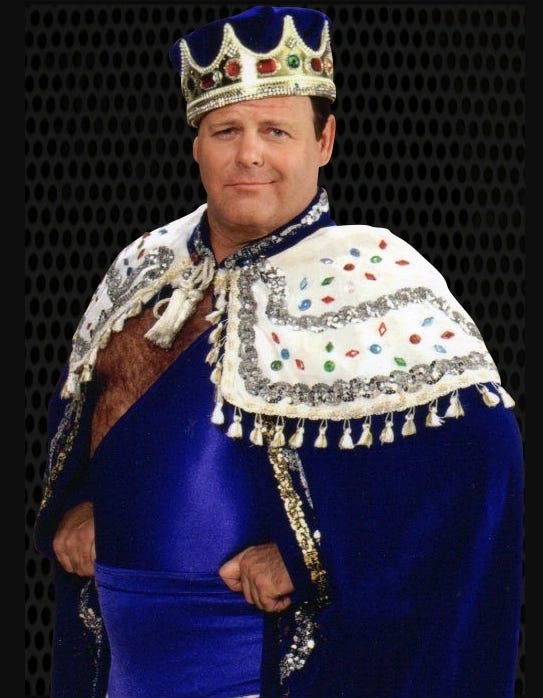I did not expect to like the documentary about Vince McMahon
Yet I'm totally enthralled! What is it doing right?
My partner and I turned on the Netflix docuseries Mr. McMahon from a place of resignation rather than excitement. It was True Crime Tuesday, and we hadn’t been captivated by the initial episode of the Menendez Bros installment of Ryan Murphy’s Monster drama series (though I hear the fifth episode is quite remarkable). So we turned on the first of the six episodes detailing Vince McMahon’s rise to pro-wrestling power, and were immediately transfixed.
And this is an unexpected response for me! I watched pro wrestling casually in the late ‘90s, but am largely ignorant both of its history and the way the subculture is operating today. And I am, shall we say, DIAMETRICALLY OPPOSED to the McMahon family politically. But there’s something about this series that is both fascinating and edifying, not just about McMahon’s crimes,1 but also the complicated way performance, physicality, and psychology interact and intersect in this particular corner of sports entertainment. I couldn’t help but wonder,2 what is Mr. McMahon doing right?
Is it nostalgia?
My immediate response to this possibility is a qualified no. As I mentioned above, I don’t have a strong connection to or memories of particular wrestlers or matches, even though my hometown, Memphis, Tennessee, has a rich history with the sport.
But maybe there is something to the nostalgia angle. The early episodes do capture a late-’80s/early-’90s style of consuming televised entertainment that is largely obsolete in today’s stream first binge later media environment. Much ink has been spilled3 discussing the decline of episodic appointment television, and the series’s description of how WCW and WWE(F at the time) played out their very real business rivalry by and through competing Monday night shows is fascinating. Additionally, did you know Pay-per-view programming used to be shown on huge screens in venues to which you would buy a ticket? I did not! Even seeing the way these athletes’ faces and bodies have softened and aged indexes the many years that have passed since I was watching wrestling. So yes, there might be something going on under the surface here for me psychologically.
Is it the style?
Maybe? Usually, I bang the drum in this newsletter for documentaries and docuseries that do something interesting with the form, whether that be visually, in terms of story presentation, or in terms of focus. Mr. McMahon . . . does none of those things. It is a straight-up talking-head style doc interspersed with clips of matches, with the director absent and mostly silent except for a few questions posed off-camera. And for whatever reason, I’m finding that refreshing? Whereas the “interview subject putting on mic and sitting down in chair” shot used to feel like a subversive nod to the inherent constructedness of the genre, now it’s become a cliché in and of itself. And though using animated sequences to replace or supplement reenactments is at times a wise and sensitive choice,4 they can also be distracting and self-indulgent. The juxtaposition of the spectacular and over-the-top visuals of the frenetic matches and the simple staging of the interview subjects speaking is almost poignant in its contrast. And for once I don’t think the series is too long! Even with six hour-long episodes, I would have been happy for the filmmakers to get more granular still.
Is it the access?
This definitely has something to do with it. The candidness and specificity of the disclosures made by interviewees from McMahon, to Hulk Hogan, to Bret Harte, to current Chief Content Officer of WWE Paul “Triple-H” Levesque is frankly shocking. I’ve written before about the way recent true-crime content has benefitted from the narcissistic tendency of certain cult leaders in particular to tape themselves constantly, blithely making the most damning statements imaginable available for packaging in a documentary.5 Though McMahon’s personality seems right in line with this kink—his self-pitying and oblivious justification for why a rival wrestling federation’s tactics, though identical to his own, were cruel and unfair, is frankly hilarious—either such footage doesn’t exist, or the director’s chose not to use it. And there’s really no need to. What McMahon and other executives and wrestlers describe on camera, knowing their words will be distributed for public consumption, is disturbing and damning enough.
Is it the THEMES?
I think it’s gotta be. I am captivated by the way stories about sports literalize and concentrate emotional and social truths. And hoo boy is this trope present in professional wrestling. From its playful hyperbolization of idealized masculinity to the way intimate interpersonal relationships are litigated through performance, to the impossible-to-police border between fantasy and reality, there is A LOT going on in the squared circle. Just to take one example, the vulnerability and pain Bret Harte expresses when recounting the Montreal Screwjob is operatic in its invocation of Shakespearian, Freudian, and biblical tropes of betrayal and vengeance.6 I’m not a big sports person, but I am a sucker for a good sports story, whether true crime or otherwise. In documentaries like this, the concepts of “game” and “play” are revealed to be what they truly are: rehearsals and reinventions of the social world at large.
So this is all to say, give Mr. McMahon a watch, even, or especially, if you’re not immediately attracted to the subject matter. And this probably goes for other true-crime properties as well. There’s so much content out there I tend to stay in my silo just out of a sense of overwhelm, but it’s such a treat to find a gem in a place where you least expect it.
Of which there are (allegedly) legion. He’s been accused of sexual assault, sexual exploitation, and paying hush money to silence his victims. He went on trial in 1993 for supplying and pushing illegal steroids (he was acquitted), and is currently accused of sex trafficking. This series was, as it is careful to note in the first episode, filmed before the latest suit was filed.
Speaking of obsolete!
Eve Batey over at Best Evidence wrote a persuasive take on the power of animated sequences to represent instances of domestic violence.
Keith Raniere of NXIVM is the gold standard of this propensity, but it also turned up in Stolen Youth about the cult at Sarah Lawrence, and the Cult of Mother God doc.
I felt the same way about the fictionalized portrayal of the Von Erich wrestling family in The Iron Claw film, btw.





Thanks for that – I was intrigued by the trailer and will definitely give this a watch this week